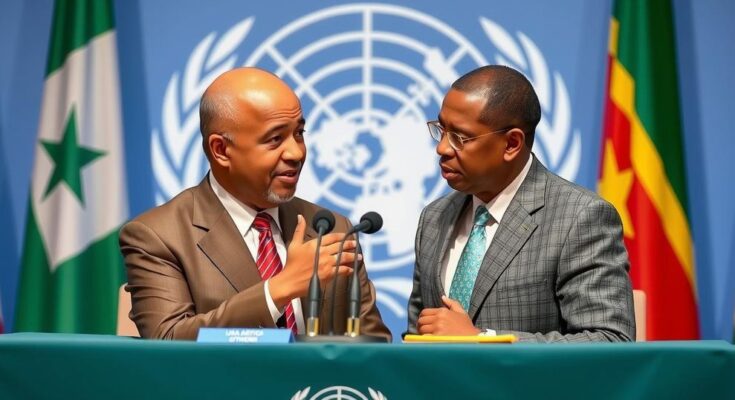The African Union urged Ethiopia and Somalia to swiftly implement a recent agreement aimed at alleviating tensions regarding Ethiopia’s access to the sea. This follows Ethiopia’s controversial deal with Somaliland, a breakaway region, leading Somalia to challenge its sovereignty. The agreement encourages bilateral cooperation and was celebrated following Turkish-mediated talks between the two nations’ leaders.
On February 17, 2024, during the 37th Ordinary Session of the African Union (AU) in Addis Ababa, AU officials urged Ethiopia and Somalia to promptly execute an agreement aimed at mitigating tensions surrounding Ethiopia’s access to the sea. The backdrop of this call comes from a recent dispute resulting from Ethiopia’s deal with Somaliland, a self-declared independent region of Somalia, involving leasing a coastal area for a port and military base—a move that Somalia views as a breach of its sovereignty.
The deal has escalated fears of renewed conflict in a historically volatile region. Following extensive negotiations facilitated by Turkey, a significant agreement was announced that encourages collaboration and prioritizes stability. Ethiopian Prime Minister Abiy Ahmed and Somali President Hassan Sheikh Mohamud conveyed mutual interests in fostering cooperation and addressing regional challenges.
AU Commission Chairman Moussa Faki Mahamat highlighted the importance of the leaders’ actions in achieving this accord but underscored the necessity for immediate implementation of the measures agreed upon. The specifics of these measures remain unspecified, but there is an emphasis on the need for a workable framework that delivers safe access to the sea for Ethiopia under Somalia’s jurisdiction. Furthermore, the Intergovernmental Authority on Development (IGAD) recognized the agreement as a notable step in resolving bilateral disputes peacefully.
As part of this new agreement, both nations will initiate technical discussions within the coming months to ensure Ethiopia’s access to the sea is effective and sustainable. However, it is unclear how this agreement will influence the controversial deal between Somaliland and Ethiopia, as the latter has expressed an unwavering desire for coastal access, citing the absence of previous hostilities regarding the issue.
In light of these developments, Somalia has solidified relations with Egypt, a traditional adversary of Ethiopia, amidst growing tensions. The outcomes of these negotiations are pivotal as they could reshape diplomatic dynamics in East Africa.
The Ethiopian-Somali relationship has been characterized by tension, particularly after Ethiopia lost its access to the sea following Eritrea’s independence in 1993. The current friction intensified when Ethiopia brokered a deal with Somaliland, which declared independence from Somalia in 1991, to lease coastal territory, prompting Somalia to assert that its sovereignty was being undermined. Efforts by the African Union and regional bodies like IGAD reflect the urgency for stabilization and collaboration in the region after a series of stalled negotiations between the two states.
The African Union’s call for swift implementation of the recent agreement between Somalia and Ethiopia marks a critical juncture in East African diplomacy. As both nations pursue a pathway to peace and stability, the effectiveness of this agreement in addressing maritime access issues and the underlying political complexities will be scrutinized. Continued vigilance and collaboration among regional stakeholders remain essential, particularly as Somalia navigates its diplomatic ties and enhances security efforts against regional threats like the Al-Shabaab insurgency.
Original Source: www.seychellesnewsagency.com




